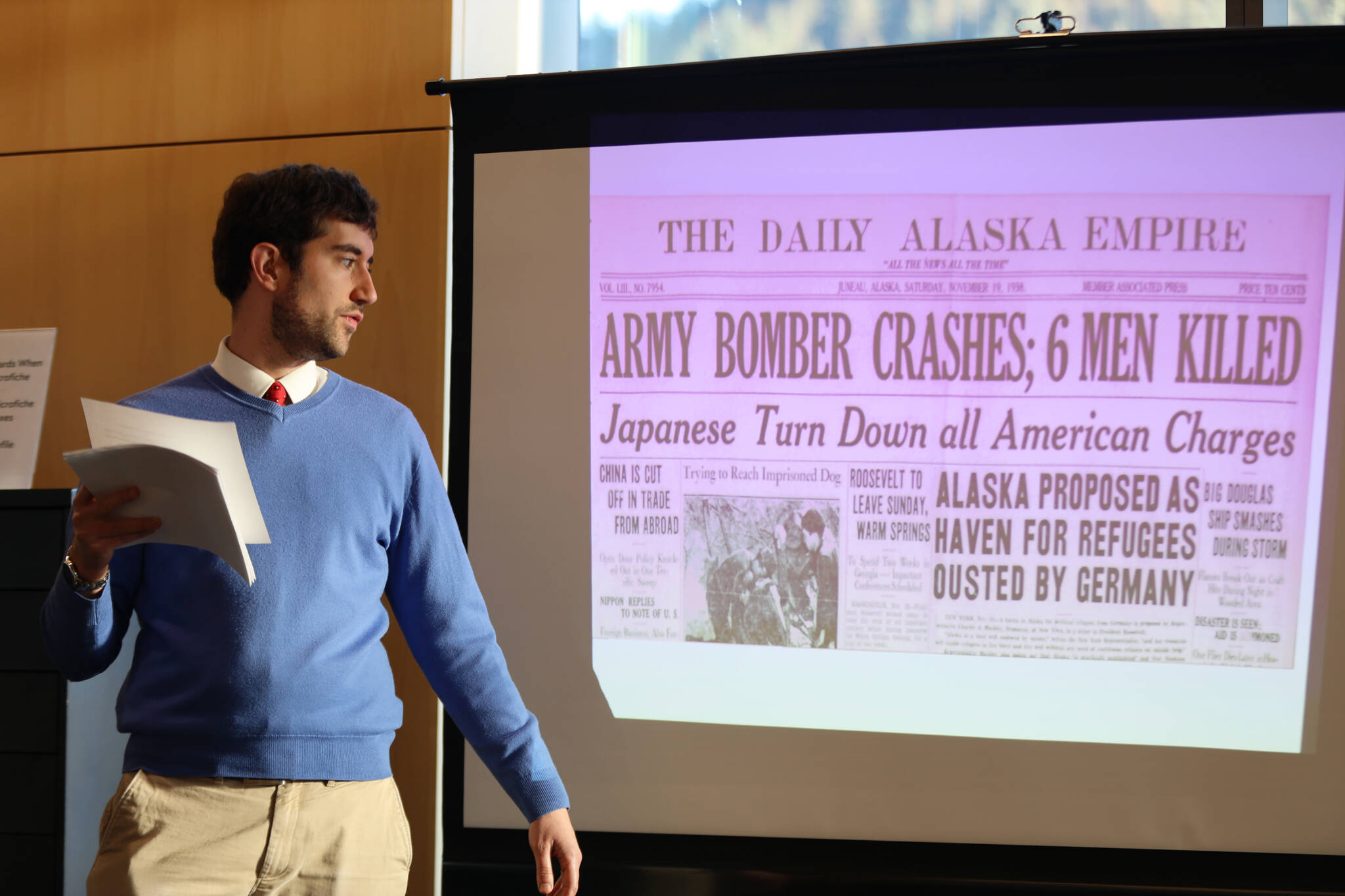CORRECTION: This article has been updated to correct the spelling of Andi Hirsh’s name. The Juneau Empire regrets the error.
For Andi Hirsh, the Holocaust ins’t far-removed history. It’s her family story and something that reverberates in her life today.
“It isn’t long ago history,” Hirsh said. “It’s about how humans treated humans, how we treat each other.”
Hirsh is the project coordinator for the exhibition, “Americans and the Holocaust,” from the U.S. Holocaust Memorial Museum currently on display at the Mendenhall Valley Public Library. The traveling exhibition examines the American response to Nazism, war and genocide during the state-sponsored, systematic murder of 6 million Jews and millions of others, including LGBTQ people, Romany people and prisoners of war by Nazi Germany in the 1930s and 1940s.
In 1938, at just 16 years old, Hirsh’s Jewish grandfather fled what was then known as Czechoslovakia with his 14-year-old sister during a time when the atmosphere in Europe was increasingly unsafe. The pair sought asylum in the U.S., and it was later found the two were the only ones in their entire family who are known to have survived.
Hirsh said it’s “incredibly” important to teach about the history of holocaust and its ties to the U.S. so that the history stays alive and can be used to examine how society acts today.
Recent surveys have underscored a necessity for efforts to raise Holocaust awareness. A nationwide Claims Conference survey of adults under 40 about Holocaust knowledge in the U.S., found more than one in 10 of the survey’s respondents had never heard the word “Holocaust” before. Similarly, a Pew Research Center survey found fewer than half of Americans were able to correctly answer multiple-choice questions about the number of Jews murdered in the Holocaust, or how Adolf Hitler came to power.
Hirsh joined a of handful of Juneau residents Thursday afternoon at the Alaska State Museum for a lecture that examined Alaska newspaper coverage of the American response to Nazism, racism, xenophobia and antisemitism during the 1930s and 1940s, present by Eric Schmalz, the Community Manager for USHMM History Unfolded Project.
Schmalz said from research over the last seven years, more than 500 articles written by Alaska newspapers have been found that provided coverage of the tragedies and genocide of the 1930 and 1940s and he noted there are likely more that have yet to be discovered.
He explained many of the key events, like the 1938 Kristallnacht violence, during the Holocaust and World War II were covered by many major Alaska papers, however, often many stories were tucked deeper into the pages rather than placed on the front page. He said examining newspapers during this time gives a glimpse into the American viewpoint of international atrocities and their societal impact.
During his lecture, Schmalz said it’s difficult to determine how the American people reacted to news reported in Alaska about the Nazism, racism, xenophobia and antisemitism that dominated the lives of so many during World War II.
“It helps challenge the popular myth that the persecution of Jews was a secret until the Munich agreement,” Schmalz said.
He said it’s difficult to say whether Alaska newspapers adequately provided coverage for residents to grasp the events during the 1930s and 1940s, since reactions were not monolithic, opinions varied and research is still being conducted to further understand what resources the American people had and the impacts it had on them.
Mary Miller, a Juneau resident who attended the lecture, said she felt issues happening during that period, such as disagreements over immigration policy and racism, are still happening today in different conflicts.
‘A lot of the same issues happening to them are happening now in Ukraine,” Miller said. “What’s happening in Ukraine, I would describe as a genocide.”
Hirsh said she hopes people visit the exhibition, along with attending the other two events happening in collaboration with it. Juneau Public Libraries is also hosting a hands-on research workshop for Alaska teachers along with hosting 20 field trips for students from Juneau schools to visit the exhibition and learn more about the history of American society during a time of war, Depression, isolationism, xenophobia, racism, antisemitism and more.
• Contact reporter Clarise Larson at clarise.larson@juneauempire.com or (651)-528-1807. Follow her on Twitter at @clariselarson.
Exhibition and event dates
The exhibition at the Mendenhall Valley Public Library, 3025 Dimond Park Loop Road, runs from Nov.1 to Dec. 20 and is open during Valley branch hours from Monday through Thursday 10 a.m. -8 p.m., Friday 12- 6 p.m., Saturday and Sunday, 12- 5 p.m. A Lecture “Holocaust Denialism and the Wilder Landscape of 21st Century Conspiracy Belief” is scheduled for Tuesday, Dec. 6 at 6 p.m. at the library. An event “Family Stories – Juneau and the Holocaust” is scheduled for Tuesday, Dec. 20 at 6 p.m.

